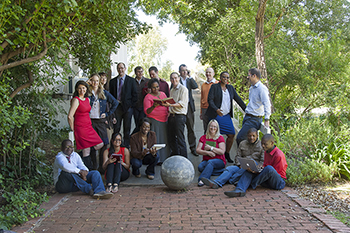Latest News Archive
Please select Category, Year, and then Month to display items
03 January 2020
|
Story Xolisa Mnukwa
|
Photo Supplied
 The UFS Bloemfontein Campus, South Campus, and Qwaqwa Campus choirs are student-centred choirs functioning under the Student Affairs’ Arts, Culture and Dialogue office.
The UFS Bloemfontein Campus, South Campus, and Qwaqwa Campus choirs are student-centred choirs functioning under the Student Affairs’ Arts, Culture and Dialogue office.
It has been a noteworthy year for the University of the Free State (UFS) Choir, establishing itself on the student/university choir scene. The choir, based on the Bloemfontein Campus, represented the UFS at the bi-annual KUESTA choir festival earlier this year, showcasing its musical talent. The choir shared a stage with other university choirs from around the country.
The UFS (Bloemfontein Campus) Choir is a 42-member ensemble of students; the other two choirs, based on the South and Qwaqwa campuses, consist of 40 and 62 members respectively. The choirs are administered and managed by the Division of Student Affairs’ Arts, Culture and Dialogue Office. In addition to Kovsie culture, the choirs strive to have a varied repertoire of inclusive music, with the UFS BFN Campus choir performing a diversity of songs in English, Afrikaans, isiXhosa, and Sesotho.
The new South Campus choir was established in 2018 and is led by choir director, Bonisile Gcisa, who specialises in choral music. This leg of the choir will therefore perform many of his works, but will also include some of the Bloemfontein choir’s set lists, since most of the choir members will be auditioning in 2021 for the Bfn choir when they change campuses.
The Qwaqwa Campus choir will lean more towards a choral genre under the direction of Sipho Khumalo.
The UFS Bloemfontein Campus choir was officially re-established under the leadership of choir conductor Leona Geldenhuys in March 2018, and has performed at several events, including the Rector’s Concert, the annual KUESTA choir convention, and the Bloemfontein Choir invitational. The group has also held a number of public performances on the Thakaneng Bridge at the UFS Bloemfontein Campus.
“Part of the UFS Student Affairs’ objective is to create an inclusive and a socially just student lived experience, and that is the mandate the choirs will also adopt. We hope to create an experience that not only enhances our students’ singing abilities, but also contribute to a more inclusive university experience.” – Angelo Mockie – Director: UFS Student Affairs Arts, Culture and Dialogue office.
“Rest well, be safe, and return rejuvenated,” were his parting words to students for the festive season.
Prestige Scholars Programme invests in promising academics
2015-06-24

Photo: Sonia Small |
Whilst many academics find it challenging to have sustainable funding for specific projects, it is often just as challenging to find relevant exposure and good mentorship programmes to fully prepare academics toward becoming full professors.
Prof Jonathan Jansen, Vice-Chancellor and Rector of the UFS, designed the Vice-Chancellor’s Prestige Scholars Programme (PSP) specifically targeting newly-completed post-doctoral students who are already members of the academic staff.
The goal is to select the most promising young scholars and to make substantial institutional investment in their development.
To date, the PSP has produced 2 Fulbright scholars; 10 National Research Foundation (NRF) rated scholars; 1 NRF Blue Skies research project and 14 NRF Thuthuka-funded projects. These scholars work with the best academics at leading universities on three continents.
Prof Jackie du Toit, co-director of the programme, explains that while the PSP does not provide funding, it is a great programme to empower scholars by means of assistance towards generating funding from outside sources.
Prof Du Toit co-directs this programme with Proff Corli Witthuhn, Vice-Rector: Research and Niel Roos from the Department of Africa Studies.
“The PSP bases its approach to funding on the philosophy that young scholars are to be encouraged towards financial independence, based on a viable postdoctoral project that would sustain their scholarship for five to eight years post PhD. We believe that the cachet and long-term sustainability of existing funding programmes such as Fulbright outweighs the short-term benefits of automatic funding from the PSP. We also endeavour to teach young scholars to work cleverly within institutional parameters, rather than leave them floundering once they step off the active PSP.”